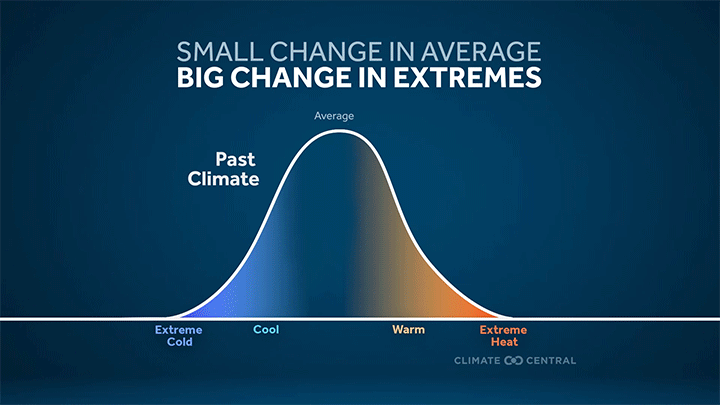
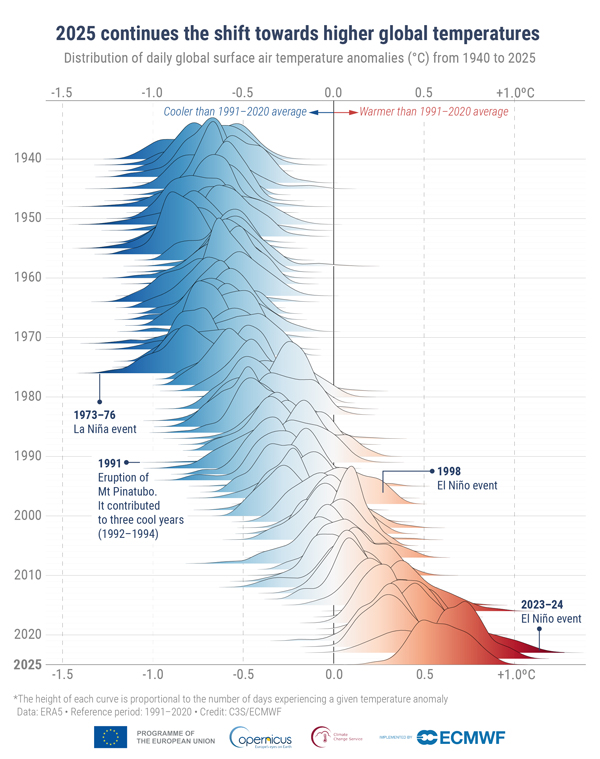 Global Temperature in 2025, 2026, 2027
by James Hansen, Pushker Kharecha, Dylan Morgan and Jasen Vest
GlobalTemperaturePrediction2025.12.18.pdf
Abstract.
Global temperature in 2025 declined 0.1°C from its El
Nino-spurred maximum in 2024, making 2025 the second warmest
year. The 2023-2025 mean is +1.5°C relative to 1880-1920. The
12-month running-mean temperature should decline for the next
few months, reaching a minimum about +1.4°C. Later in 2026,
we expect the 12-month running-mean temperature to begin to
rise, as dynamical models show development of an El Nino. We
project a global temperature record of +1.7°C in 2027, which
will provide further confirmation of the recent global
warming acceleration.
Global Temperature in 2025, 2026, 2027
by James Hansen, Pushker Kharecha, Dylan Morgan and Jasen Vest
GlobalTemperaturePrediction2025.12.18.pdf
Abstract.
Global temperature in 2025 declined 0.1°C from its El
Nino-spurred maximum in 2024, making 2025 the second warmest
year. The 2023-2025 mean is +1.5°C relative to 1880-1920. The
12-month running-mean temperature should decline for the next
few months, reaching a minimum about +1.4°C. Later in 2026,
we expect the 12-month running-mean temperature to begin to
rise, as dynamical models show development of an El Nino. We
project a global temperature record of +1.7°C in 2027, which
will provide further confirmation of the recent global
warming acceleration.
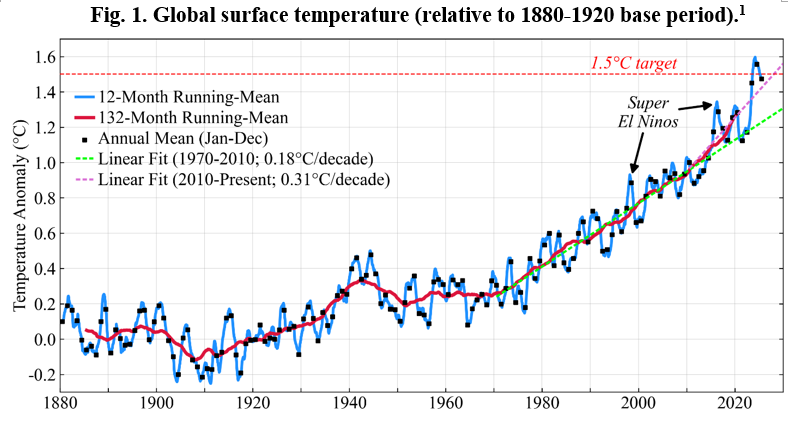
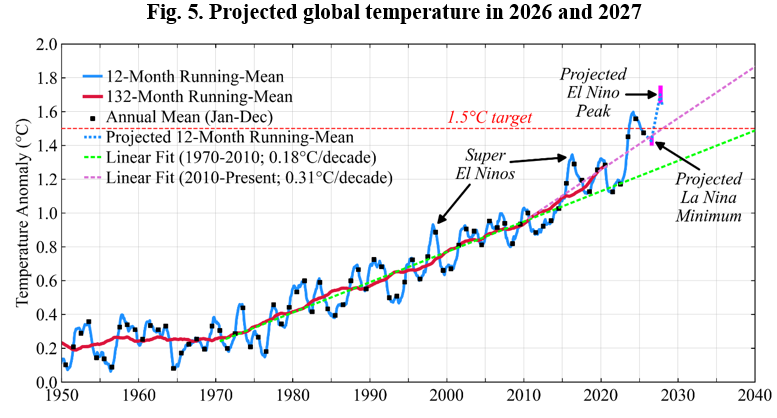 Just Have A Think | The money men know the truth about
planetary boundaries! (16+ min)
money_men.mp4
Institute and Faculty of Actuaries | The Emperor's New Climate
Scenarios - Limitations and assumptions of commonly used
climate-change scenarios in financial services
https://actuaries.org.uk/media/qeydewmk/the-emperor-s-new-climate-scenarios_ifoa_23.pdf
Everyone who cares about the stability of our financial
system should read this paper. Failing to include known
non-linear effects in strategic thinking about climate
change will lead to complacency, heightened risk and missed
opportunities. So the scenarios that are used as part of
TCFD processes really matter - both because economic damage
will grow much faster and because the transition to clean
technologies will happen much faster than conventional
economic modelling suggests.
Just Have A Think | The money men know the truth about
planetary boundaries! (16+ min)
money_men.mp4
Institute and Faculty of Actuaries | The Emperor's New Climate
Scenarios - Limitations and assumptions of commonly used
climate-change scenarios in financial services
https://actuaries.org.uk/media/qeydewmk/the-emperor-s-new-climate-scenarios_ifoa_23.pdf
Everyone who cares about the stability of our financial
system should read this paper. Failing to include known
non-linear effects in strategic thinking about climate
change will lead to complacency, heightened risk and missed
opportunities. So the scenarios that are used as part of
TCFD processes really matter - both because economic damage
will grow much faster and because the transition to clean
technologies will happen much faster than conventional
economic modelling suggests.
The Global Tipping Points Report
https://global-tipping-points.org
https://global-tipping-points.org/summary-report/key-messages/
https://global-tipping-points.org/summary-report/key-recommendations/
https://global-tipping-points.org/summary-report/narrative-summary/
For example, the collapse of the Atlantic Ocean’s great
overturning circulation combined with global warming could
cause half of the global area for growing wheat and maize to
be lost. Five major tipping points are already at risk of
being crossed due to warming right now and three more are
threatened in the 2030s as the world exceeds 1.5°C global
warming.
The full damage caused by negative tipping points will be
far greater than their initial impact. The effects will
cascade through globalised social and economic systems, and
could exceed the ability of some countries to adapt.
Negative tipping points show that the threat posed by the
climate and ecological crisis is far more severe than is
commonly understood and is of a magnitude never before faced
by humanity.
https://www.stockholmresilience.org/research/planetary-boundaries.html
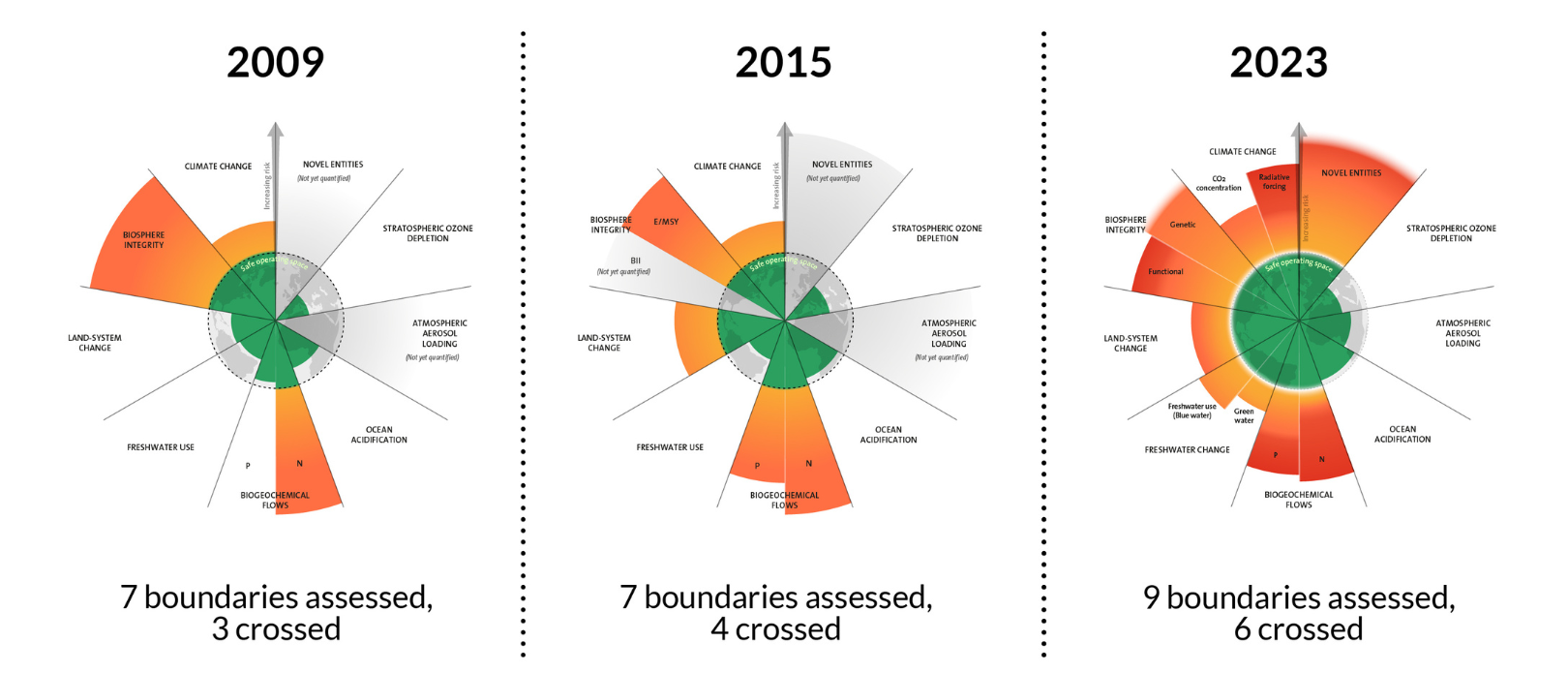 The nine planetary boundaries and their status - Clockwise
from the 11 o'clock position:
1. Climate change: Increased greenhouse gases and aerosols in
Earth's atmosphere trap heat that would otherwise escape into
space. The climate change planetary boundary assesses the
change in the ratio of incoming and outgoing energy of the
Earth. More carbon dioxide in the atmosphere and more trapped
radiation causes global temperatures to rise and alters
climate patterns. This boundary is transgressed, and CO2
concentrations are rising.
2. Novel entities: Technological developments introduce novel
synthetic chemicals into the environment, mobilize materials
in wholly new ways, modify the genetics of living organisms,
and otherwise intervene in evolutionary processes and change
the functioning of the Earth system. The amount of synthetic
substances released into the environment without adequate
safety testing places novel entities in the high-risk zone.
3. Stratospheric ozone depletion: Ozone high in the atmosphere
protects life on Earth from incoming ultraviolet radiation.
The thinning of the ozone layer, primarily due to human-made
chemicals, allows more harmful UV radiation to reach Earth's
surface. Total ozone is slowly recovering because of the
international phasing-out of ozone-depleting substances since
the late 1980s. Ozone depletion is therefore currently in the
Safe Operating Space.
4. Atmospheric aerosol loading: Changes in airborne particles
from human activities and natural sources influence the
climate by altering temperature and precipitation patterns.
Although large-scale air pollution already causes changes to
monsoon systems, forest biomes and marine ecosystems, the
global metric used in the planetary boundaries framework –
interhemispheric difference in atmospheric aerosol loading –
places this process just within the Safe Operating Space.
5. Ocean acidification: The acidity of ocean water increases
(its pH decreases) as it absorbs atmospheric CO2. This
process harms organisms that need calcium carbonate to make
their shells or skeletons, impacting marine ecosystems, and
it reduces the ocean's efficiency in acting as a carbon sink.
The 2025 Planetary Health Check showed that the Ocean
Acidification boundary has been breached for the first time.
Since the start of the industrial era, the ocean’s surface pH
has fallen by around 0.1 units, a 30-40% increase in acidity,
pushing marine ecosystems beyond safe limits and degrading
the oceans’ ability to act as Earth’s stabiliser.
6. Modification of biogeochemical flows: Nutrient elements
like nitrogen and phosphorus are crucial for supporting life
and maintaining ecosystems. Industrial and agricultural
processes disrupt natural cycles and modify the nutrient
balance for living organisms. This boundary is transgressed,
because both the global phosphorus flow into the ocean and
the industrial fixation of nitrogen (converting stable
nitrogen from the atmosphere into bioreactive forms) have
disrupted global biogeochemical flows.
7. Freshwater change: The alteration of freshwater cycles,
including rivers and soil moisture, impacts natural functions
such as carbon sequestration and biodiversity, and can lead
to shifts in precipitation levels. Human-induced disturbances
of both blue water (e.g. rivers and lakes) and green water
(i.e. soil moisture) have exceeded the planetary boundary.
8. Land system change: The transformation of natural landscapes,
such as through deforestation and urbanization, disrupts
habitats and biodiversity and diminishes ecological functions
like carbon sequestration and moisture recycling. Globally,
the remaining forest areas in tropical, boreal, and temperate
biomes have fallen below safe levels.
9. Biosphere integrity: The diversity, extent, and health of
living organisms and ecosystems affects the state of the
planet by co-regulating the energy balance and chemical
cycles on Earth. Disrupting biodiversity threatens this
co-regulation and dynamic stability. Both the loss of genetic
diversity and the decline in the functional integrity of the
biosphere are outside safe levels.
The nine planetary boundaries and their status - Clockwise
from the 11 o'clock position:
1. Climate change: Increased greenhouse gases and aerosols in
Earth's atmosphere trap heat that would otherwise escape into
space. The climate change planetary boundary assesses the
change in the ratio of incoming and outgoing energy of the
Earth. More carbon dioxide in the atmosphere and more trapped
radiation causes global temperatures to rise and alters
climate patterns. This boundary is transgressed, and CO2
concentrations are rising.
2. Novel entities: Technological developments introduce novel
synthetic chemicals into the environment, mobilize materials
in wholly new ways, modify the genetics of living organisms,
and otherwise intervene in evolutionary processes and change
the functioning of the Earth system. The amount of synthetic
substances released into the environment without adequate
safety testing places novel entities in the high-risk zone.
3. Stratospheric ozone depletion: Ozone high in the atmosphere
protects life on Earth from incoming ultraviolet radiation.
The thinning of the ozone layer, primarily due to human-made
chemicals, allows more harmful UV radiation to reach Earth's
surface. Total ozone is slowly recovering because of the
international phasing-out of ozone-depleting substances since
the late 1980s. Ozone depletion is therefore currently in the
Safe Operating Space.
4. Atmospheric aerosol loading: Changes in airborne particles
from human activities and natural sources influence the
climate by altering temperature and precipitation patterns.
Although large-scale air pollution already causes changes to
monsoon systems, forest biomes and marine ecosystems, the
global metric used in the planetary boundaries framework –
interhemispheric difference in atmospheric aerosol loading –
places this process just within the Safe Operating Space.
5. Ocean acidification: The acidity of ocean water increases
(its pH decreases) as it absorbs atmospheric CO2. This
process harms organisms that need calcium carbonate to make
their shells or skeletons, impacting marine ecosystems, and
it reduces the ocean's efficiency in acting as a carbon sink.
The 2025 Planetary Health Check showed that the Ocean
Acidification boundary has been breached for the first time.
Since the start of the industrial era, the ocean’s surface pH
has fallen by around 0.1 units, a 30-40% increase in acidity,
pushing marine ecosystems beyond safe limits and degrading
the oceans’ ability to act as Earth’s stabiliser.
6. Modification of biogeochemical flows: Nutrient elements
like nitrogen and phosphorus are crucial for supporting life
and maintaining ecosystems. Industrial and agricultural
processes disrupt natural cycles and modify the nutrient
balance for living organisms. This boundary is transgressed,
because both the global phosphorus flow into the ocean and
the industrial fixation of nitrogen (converting stable
nitrogen from the atmosphere into bioreactive forms) have
disrupted global biogeochemical flows.
7. Freshwater change: The alteration of freshwater cycles,
including rivers and soil moisture, impacts natural functions
such as carbon sequestration and biodiversity, and can lead
to shifts in precipitation levels. Human-induced disturbances
of both blue water (e.g. rivers and lakes) and green water
(i.e. soil moisture) have exceeded the planetary boundary.
8. Land system change: The transformation of natural landscapes,
such as through deforestation and urbanization, disrupts
habitats and biodiversity and diminishes ecological functions
like carbon sequestration and moisture recycling. Globally,
the remaining forest areas in tropical, boreal, and temperate
biomes have fallen below safe levels.
9. Biosphere integrity: The diversity, extent, and health of
living organisms and ecosystems affects the state of the
planet by co-regulating the energy balance and chemical
cycles on Earth. Disrupting biodiversity threatens this
co-regulation and dynamic stability. Both the loss of genetic
diversity and the decline in the functional integrity of the
biosphere are outside safe levels.
The Intergovernmental Panel on Climate Change (IPCC) is the
United Nations body for assessing the science related to
climate change.
The IPCC prepares comprehensive Assessment Reports about the
state of scientific, technical and socio-economic knowledge on
climate change, its impacts and future risks, and options for
reducing the rate at which climate change is taking place. It
also produces Special Reports on topics agreed to by its
member governments, as well as Methodology Reports that
provide guidelines for the preparation of greenhouse gas
inventories. The IPCC is working on the Sixth Assessment
Report which consists of three Working Group contributions and
a Synthesis Report. The Working Group I contribution was
finalized in August 2021, the Working Group II contribution in
February 2022 and the Working Group III contribution in April
2022.
IPCC Sixth Assessment Reports (AR6) (2021-2023)
https://www.ipcc.ch/reports/
AR6 Climate Change 2021: The Physical Science Basis
https://www.ipcc.ch/report/sixth-assessment-report-working-group-i/ <==
AR6 Climate Change 2022: Mitigation of Climate Change
https://www.ipcc.ch/report/sixth-assessment-report-working-group-3/
AR6 Climate Change 2022: Impacts, Adaptation and Vulnerability
https://www.ipcc.ch/report/sixth-assessment-report-working-group-ii/
https://www.ipcc.ch/report/ar6/wg2/downloads/report/IPCC_AR6_WGII_SummaryForPolicymakers.pdf
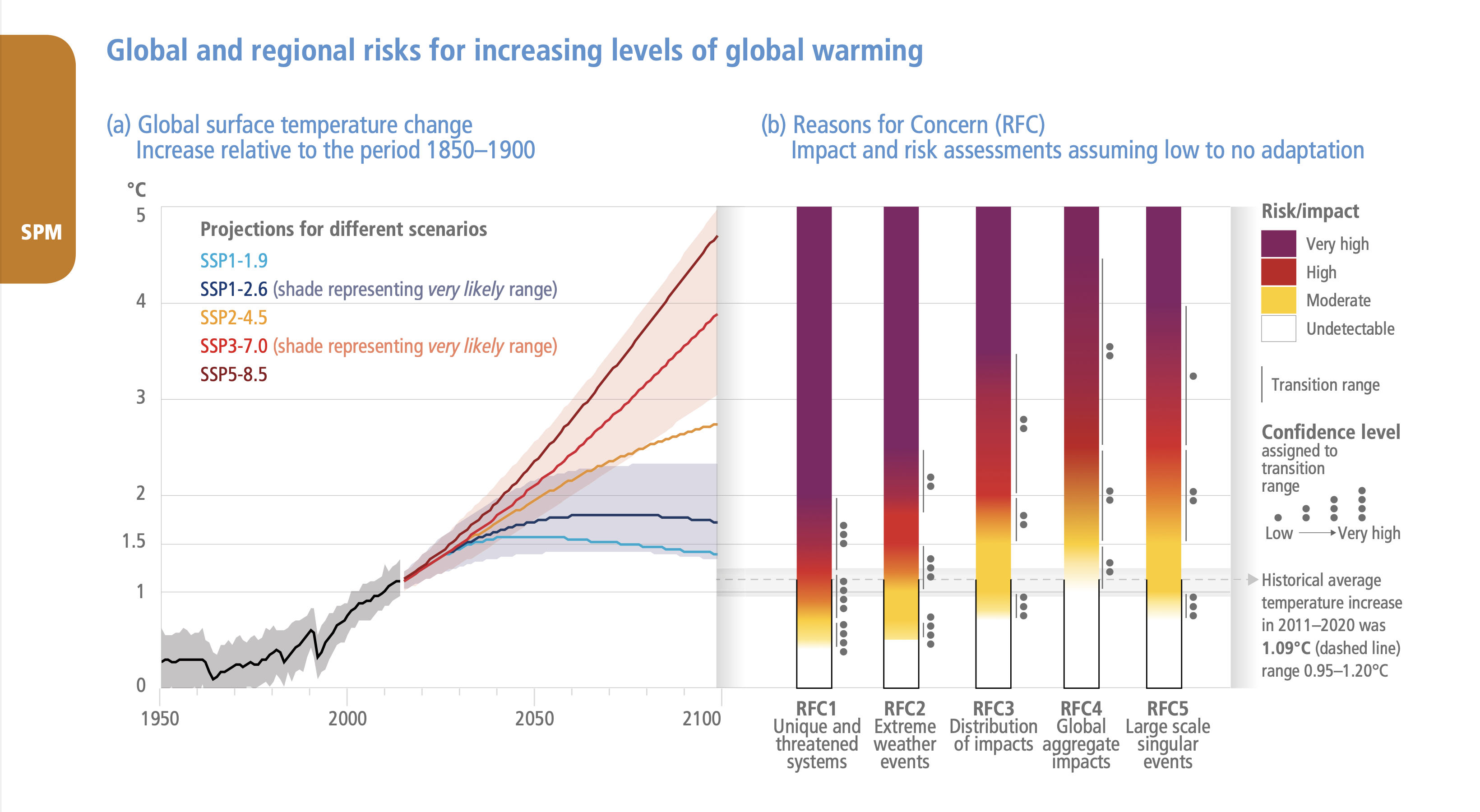 https://www.ipcc.ch/report/ar6/wg2/resources/spm-headline-statements/
Observed and Projected Impacts and Risks
Beyond 2040 and depending on the level of global warming,
climate change will lead to numerous risks to natural and
human systems (high confidence).
https://www.ipcc.ch/report/ar6/wg2/downloads/outreach/IPCC_AR6_WGII_FactSheet_NorthAmerica.pdf
AR6 Synthesis Report: Climate Change 2023
https://www.ipcc.ch/report/sixth-assessment-report-cycle/
IPCC: Climate change: a threat to human wellbeing and health
of the planet. Taking action now can secure our future
https://www.ipcc.ch/2022/02/28/pr-wgii-ar6/
BERLIN - Human-induced climate change is causing dangerous
and widespread disruption in nature and affecting the lives
of billions of people around the world, despite efforts to
reduce the risks. People and ecosystems least able to cope
are being hardest hit, said scientists in the latest
Intergovernmental Panel on Climate Change (IPCC) report,
released today.
"This report is a dire warning about the consequences of
inaction," said Hoesung Lee, Chair of the IPCC. "It shows
that climate change is a grave and mounting threat to our
wellbeing and a healthy planet. Our actions today will shape
how people adapt and nature responds to increasing climate
risks."
Daily Surface Air Temperature (Interactive)
https://climatereanalyzer.org/clim/t2_daily/?dm_id=world
Daily Sea Surface Temperature (Interactive)
https://climatereanalyzer.org/clim/sst_daily/?dm_id=world2
Scientists Discover Alarming Evidence Global Warning Is Accelerating
https://www.sciencealert.com/scientists-discover-alarming-evidence-global-warning-is-accelerating
https://www.ipcc.ch/report/ar6/wg2/resources/spm-headline-statements/
Observed and Projected Impacts and Risks
Beyond 2040 and depending on the level of global warming,
climate change will lead to numerous risks to natural and
human systems (high confidence).
https://www.ipcc.ch/report/ar6/wg2/downloads/outreach/IPCC_AR6_WGII_FactSheet_NorthAmerica.pdf
AR6 Synthesis Report: Climate Change 2023
https://www.ipcc.ch/report/sixth-assessment-report-cycle/
IPCC: Climate change: a threat to human wellbeing and health
of the planet. Taking action now can secure our future
https://www.ipcc.ch/2022/02/28/pr-wgii-ar6/
BERLIN - Human-induced climate change is causing dangerous
and widespread disruption in nature and affecting the lives
of billions of people around the world, despite efforts to
reduce the risks. People and ecosystems least able to cope
are being hardest hit, said scientists in the latest
Intergovernmental Panel on Climate Change (IPCC) report,
released today.
"This report is a dire warning about the consequences of
inaction," said Hoesung Lee, Chair of the IPCC. "It shows
that climate change is a grave and mounting threat to our
wellbeing and a healthy planet. Our actions today will shape
how people adapt and nature responds to increasing climate
risks."
Daily Surface Air Temperature (Interactive)
https://climatereanalyzer.org/clim/t2_daily/?dm_id=world
Daily Sea Surface Temperature (Interactive)
https://climatereanalyzer.org/clim/sst_daily/?dm_id=world2
Scientists Discover Alarming Evidence Global Warning Is Accelerating
https://www.sciencealert.com/scientists-discover-alarming-evidence-global-warning-is-accelerating
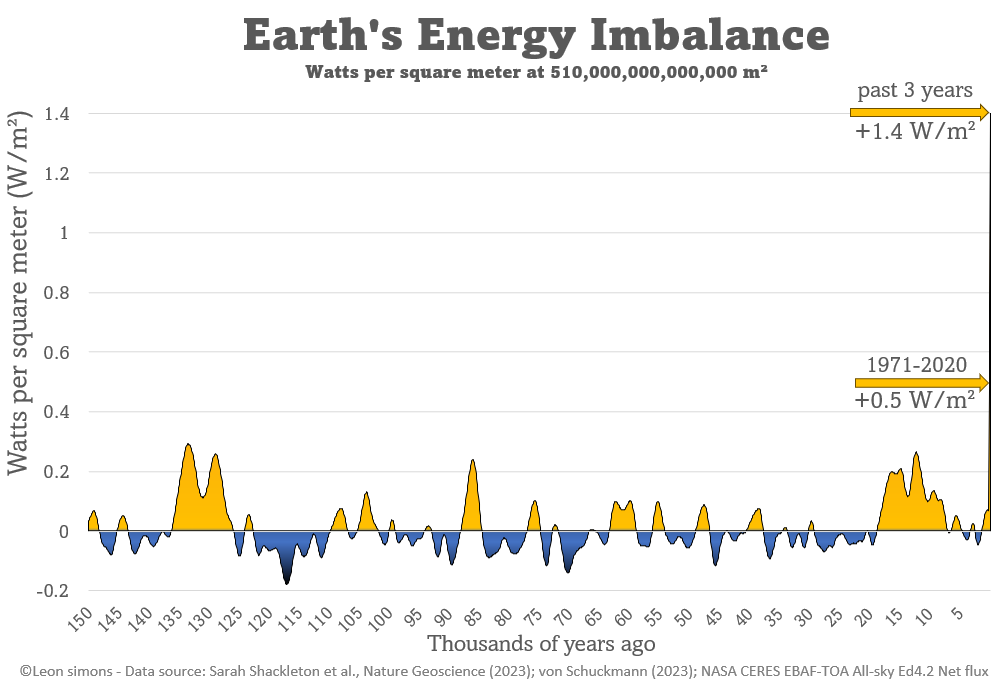
European climate risk assessment (2024)
Executive summary
EXECUTIVE_SUMMARY_European_climate_risk_assessment_TH-AL-24-001-EN-N.pdf
This assessment identifies 36 climate risks with potentially
severe consequences across Europe. The risks are evaluated
in the contexts of risk severity, policy horizon (lead time
and decision horizon), policy readiness and risk ownership.
It further identifies priorities for EU policy action, based
on a structured risk assessment united with qualitative
aspects, such as considering social justice.
Fifth National Climate Assessment (NCA5)
https://nca2023.globalchange.gov
The Fifth National Climate Assessment is the US Government?s
preeminent report on climate change impacts, risks, and
responses. It is a congressionally mandated interagency
effort that provides the scientific foundation to support
informed decision-making across the United States.
The more the planet warms, the greater the impacts. Without
rapid and deep reductions in global greenhouse gas emissions
from human activities, the risks of accelerating sea level
rise, intensifying extreme weather, and other harmful
climate impacts will continue to grow. Each additional
increment of warming is expected to lead to more damage and
greater economic losses compared to previous increments of
warming, while the risk of catastrophic or unforeseen
consequences also increases.
RECENT CLIMATE SCIENCE NEWS
https://climate.law.columbia.edu
https://www.columbia.edu/~jeh1/
https://sciurls.com/?q=climate
Third of Earth's Landmass Could Soon Be Too Hot For Over 60s
https://www.sciencealert.com/third-of-earths-landmass-could-soon-be-too-hot-for-over-60s
Scientists warn that if global warming reaches 2 degrees
Celsius, extreme heat will make a third of Earth’s landmass
uninhabitable for people over 60. Younger adults will also
face increased risk, with unsafe temperatures potentially
tripling. The study highlights the urgent need to limit
warming to mitigate the deadly consequences of heat stress.
Two Major Studies Agree Earth Is Entering Frightening New
Climate Phase
https://www.sciencealert.com/two-major-studies-agree-earth-is-entering-frightening-new-climate-phase
https://theconversation.com/earth-is-already-shooting-through-the-1-5-c-global-warming-limit-two-major-studies-show-249133
Two studies suggest Earth has likely entered a new climate
phase, with 2024 marking the first year of consistent global
temperatures exceeding the 1.5°C Paris Agreement threshold.
While year-to-year fluctuations exist, these studies
indicate a single year or month above this threshold
signifies a long-term breach. Urgent action is needed to
reduce emissions and adapt to the worsening impacts of
climate change.
OLDER CLIMATE SCIENCE NEWS
Wildfires Surged During Past Climate Shifts, Ancient Antarctic
Ice Reveals : ScienceAlert
https://www.sciencealert.com/wildfires-surged-during-past-climate-shifts-ancient-antarctic-ice-reveals
Ancient Antarctic ice reveals that wildfires surged during
past climate shifts, particularly during abrupt events like
Heinrich and Dansgaard-Oeschger events. These events,
characterized by significant shifts in rainfall patterns and
temperature, triggered massive wildfires, as evidenced by
the isotopic composition of methane trapped in the ice. This
finding suggests a link between climate change and wildfire
activity, a phenomenon that could be exacerbated by modern
global warming.
The Climate Change We've Already Created Will Last 50,000
Years, Scientists Warn : ScienceAlert
https://www.sciencealert.com/the-climate-change-weve-already-created-will-last-50000-years-scientists-warn
The Anthropocene, a proposed geological epoch, represents
Earth’s transformation by industrialized humanity, with
climate change as a defining symptom. Recent record-breaking
temperatures, driven by rising greenhouse gases and other
human activities, have pushed the planet into levels of
warmth not experienced in 120,000 years. This disruption of
Earth’s natural climate patterns will persist for at least
50,000 years, necessitating negative emissions to mitigate
its impact.
'It won't go back to normal': What this year's heat waves mean
for life in the coming years
https://www.mercurynews.com/2023/08/18/it-wont-go-back-to-normal-what-this-years-heat-waves-mean-for-life-in-the-coming-years/
Whatever your views are about climate change and the source
of this warming, it is happening, and it's happening fast.
We need to get smart about the implications of living with
extreme heat because we're going to be doing it whether we
like it or not, for our own welfare and for our loved ones.
Our Fragile Earth: How Close Are We to Climate Catastrophe?
https://www.scientificamerican.com/article/our-fragile-earth-how-close-are-we-to-climate-catastrophe/
Science tells us that if we act quickly, if we act
dramatically, we can avoid warming that will bring far worse
consequences. That's the fragility of this moment: we have a
little bit of a safety margin, but it's not a large safety
margin. The phrase I use often these days, a phrase that
characterizes the message of this book, is the pairing of
urgency and agency.
Yes, it's bad, and we face far worse consequences if we
don't act. We can see devastating climate consequences
already. That's the urgency. But the paleoclimate record
tells us we haven't triggered runaway warming yet. We can
avoid that point of no return if we act quickly and
dramatically.
Ecological doom-loops: Why ecosystem collapses may occur much
sooner than expected
https://phys.org/news/2023-06-ecological-doom-loops-ecosystem-collapses-sooner.html
What really worries us is that climate extremes could hit
already stressed ecosystems, which in turn transfer new or
heightened stresses to some other ecosystem, and so on. This
means one collapsing ecosystem could have a knock-on effect
on neighboring ecosystems through successive feedback loops:
an "ecological doom-loop" scenario, with catastrophic
consequences.
There is no Plan B for dealing with the climate crisis
By Raymond T. Pierrehumbert, August 30, 2019
https://www.tandfonline.com/doi/full/10.1080/00963402.2019.1654255
Let's get this on the table right away, without mincing
words. With regard to the climate crisis, yes, it's time to
panic. We are in deep trouble. To understand why, it is
necessary to understand something about carbon budgets.
Some of the carbon dioxide added to the atmosphere by human
activities such as fossil fuel burning is quickly taken up
by the upper ocean and land ecosystems. Some of the rest is
slowly absorbed into the deep ocean over the next
millennium. However, a lot remains in the atmosphere, and it
is only slowly removed by geological processes that take
hundreds of thousands of years. Consequently, carbon dioxide
accumulates in the atmosphere throughout the lifetime of the
fossil-fueled economy, and it will not drop much even after
we finally kick the carbon habit and cease our carbon
dioxide emissions.
If CO2 Emissions Keep Up, Earth Is Headed Back to The Triassic
Period -- Or Worse
https://www.sciencealert.com/if-co2-emissions-keep-up-earth-is-headed-back-to-the-triassic-period-or-worse
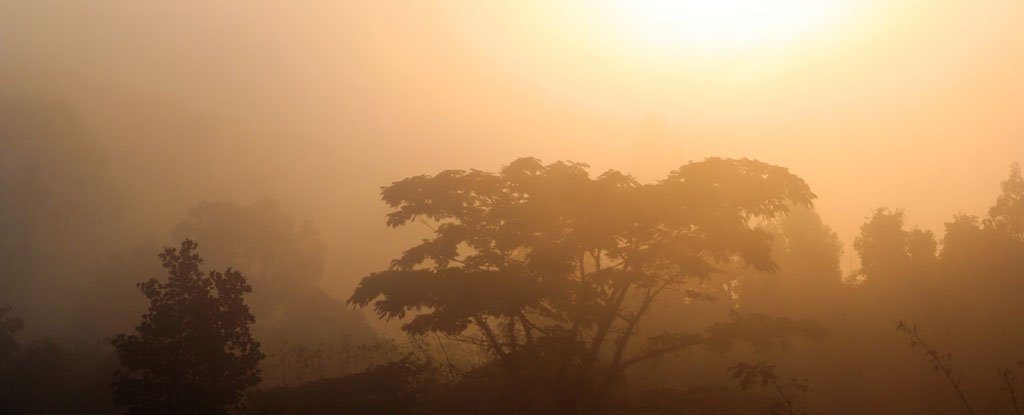 It's no secret that our planet is getting hotter due to
heat-trapping carbon dioxide (CO2) emissions, but a new
study suggests that current global warming trends could
produce a climate not seen in almost half a billion years of
Earth's history.
Worried about Earth's future? Well, the outlook is worse than
even scientists can grasp
https://phys.org/news/2021-01-earth-future-outlook-worse-scientists.html
Anyone with even a passing interest in the global
environment knows all is not well. But just how bad is the
situation? Our new paper shows the outlook for life on Earth
is more dire than is generally understood.
The research published today reviews more than 150 studies
to produce a stark summary of the state of the natural
world. We outline the likely future trends in biodiversity
decline, mass extinction, climate disruption and planetary
toxification. We clarify the gravity of the human
predicament and provide a timely snapshot of the crises that
must be addressed now.
The exorbitant cost of climate procrastination
https://phys.org/news/2019-02-exorbitant-climate-procrastination.html
A 3°C warming would wreak havoc on the planet, justifying
the absolute necessity of the +1.5°C limit. However, even
a +1.5°C change would incur heavy consequences. The
adaptation cost would undoubtedly be high both for current
and future generations: loss of agricultural yields,
sea-level rise, whole regions rendered uninhabitable,
leading to massive flows of climate migrants, collapse of
the ecosystems and impoverished biodiversity, extreme
meteorological events, seashore and topsoil erosion... All
these effects will grow even more dire as global warming
proceeds."
How climate change can make catastrophic weather systems
linger for longer
https://phys.org/news/2019-02-climate-catastrophic-weather-linger-longer.html
There does seem to be a plausible link between human-induced
warming, slowing of jet streams, blocking highs, and extreme
weather around the world. There is also a trend for the
slowing of the forward speed (as opposed to wind speed) of
tropical cyclones around the world. One recent study showed
the average forward speeds of tropical cyclones fell by 10%
worldwide between 1949 and 2016. Meanwhile, over the same
period, the forward speed of tropical cyclones dropped by
22% over land in the Australian region.
The Fall of The Amazon Could Trigger a Global Cascade of
Tipping Points
https://www.sciencealert.com/the-fall-of-the-amazon-could-trigger-a-global-cascade-of-tipping-points
If the Amazon crosses a critical threshold of
self-resilience, a new study suggests the disaster could set
off a domino effect, knocking over tipping points elsewhere
in the world, too, abruptly accelerating environmental
crises and causing irreparable damage to the planet.
Tipping points in the global climate system, such as
collapsing ice sheets, glacier melt, forest dieback, sea
level rise, and shifting monsoons, have received a lot more
attention in recent years.
Each one of these switches could seriously turn up the heat
on our planet, creating a 'hothouse Earth' with irreversible
and catastrophic effects.
They are all connected by the global greenhouse effect, but
in a climate crisis, it's uncertain in what order they will
ultimately fall.
It's no secret that our planet is getting hotter due to
heat-trapping carbon dioxide (CO2) emissions, but a new
study suggests that current global warming trends could
produce a climate not seen in almost half a billion years of
Earth's history.
Worried about Earth's future? Well, the outlook is worse than
even scientists can grasp
https://phys.org/news/2021-01-earth-future-outlook-worse-scientists.html
Anyone with even a passing interest in the global
environment knows all is not well. But just how bad is the
situation? Our new paper shows the outlook for life on Earth
is more dire than is generally understood.
The research published today reviews more than 150 studies
to produce a stark summary of the state of the natural
world. We outline the likely future trends in biodiversity
decline, mass extinction, climate disruption and planetary
toxification. We clarify the gravity of the human
predicament and provide a timely snapshot of the crises that
must be addressed now.
The exorbitant cost of climate procrastination
https://phys.org/news/2019-02-exorbitant-climate-procrastination.html
A 3°C warming would wreak havoc on the planet, justifying
the absolute necessity of the +1.5°C limit. However, even
a +1.5°C change would incur heavy consequences. The
adaptation cost would undoubtedly be high both for current
and future generations: loss of agricultural yields,
sea-level rise, whole regions rendered uninhabitable,
leading to massive flows of climate migrants, collapse of
the ecosystems and impoverished biodiversity, extreme
meteorological events, seashore and topsoil erosion... All
these effects will grow even more dire as global warming
proceeds."
How climate change can make catastrophic weather systems
linger for longer
https://phys.org/news/2019-02-climate-catastrophic-weather-linger-longer.html
There does seem to be a plausible link between human-induced
warming, slowing of jet streams, blocking highs, and extreme
weather around the world. There is also a trend for the
slowing of the forward speed (as opposed to wind speed) of
tropical cyclones around the world. One recent study showed
the average forward speeds of tropical cyclones fell by 10%
worldwide between 1949 and 2016. Meanwhile, over the same
period, the forward speed of tropical cyclones dropped by
22% over land in the Australian region.
The Fall of The Amazon Could Trigger a Global Cascade of
Tipping Points
https://www.sciencealert.com/the-fall-of-the-amazon-could-trigger-a-global-cascade-of-tipping-points
If the Amazon crosses a critical threshold of
self-resilience, a new study suggests the disaster could set
off a domino effect, knocking over tipping points elsewhere
in the world, too, abruptly accelerating environmental
crises and causing irreparable damage to the planet.
Tipping points in the global climate system, such as
collapsing ice sheets, glacier melt, forest dieback, sea
level rise, and shifting monsoons, have received a lot more
attention in recent years.
Each one of these switches could seriously turn up the heat
on our planet, creating a 'hothouse Earth' with irreversible
and catastrophic effects.
They are all connected by the global greenhouse effect, but
in a climate crisis, it's uncertain in what order they will
ultimately fall.
ISU professor of Geological and Atmospheric Sciences
Bill Gutowski - Global Climate Change 101
https://isualumblog.wordpress.com/2015/08/20/global-climate-change-101/
ISU professor of Geological and Atmospheric Sciences
Eugene S. Takle (ISU) | Outreach Presentations
https://meteor.geol.iastate.edu/faculty/takle/index.html
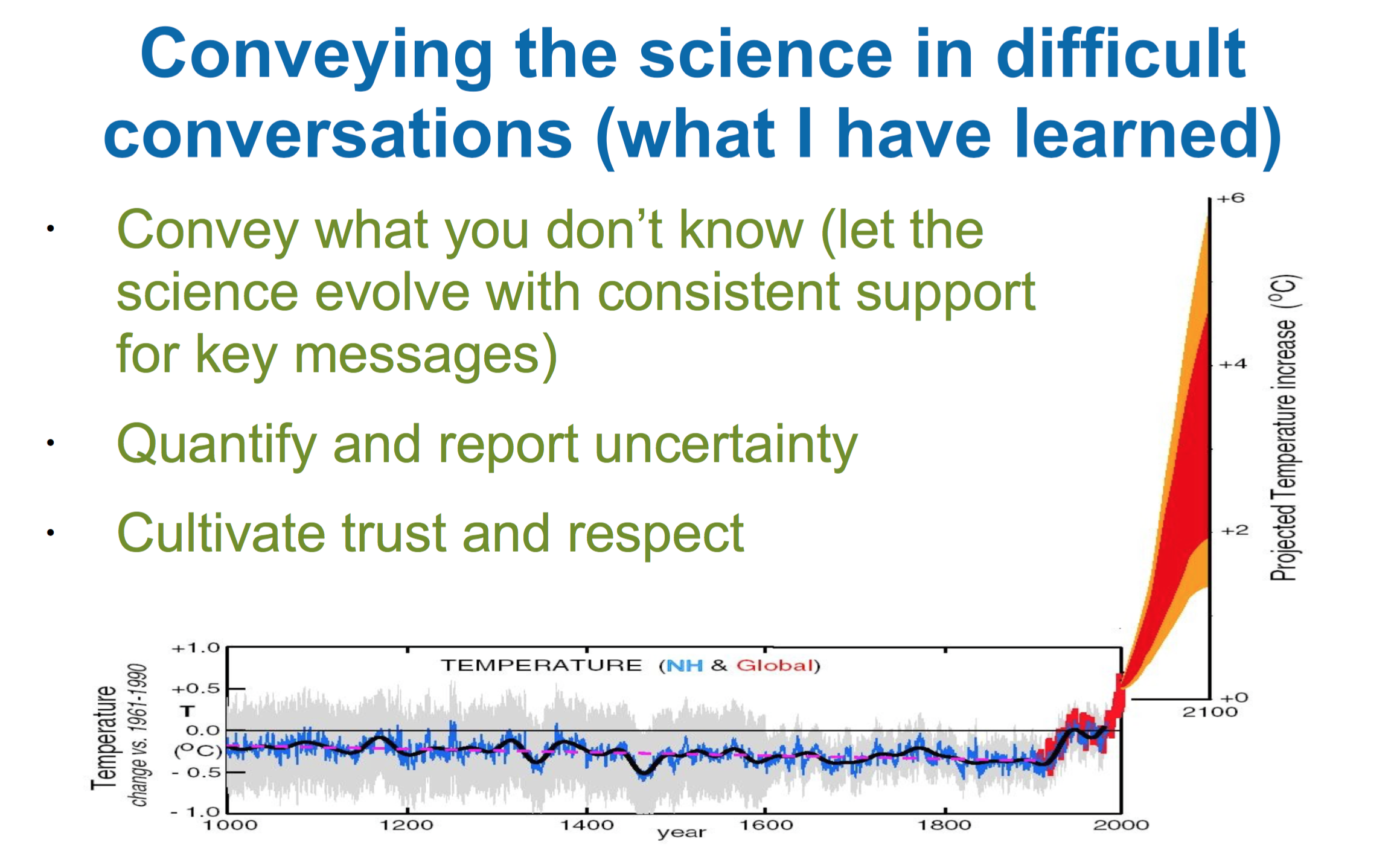 Global Warming Has Accelerated: Are the United Nations and the
Public Well-Informed?
https://www.tandfonline.com/doi/full/10.1080/00139157.2025.2434494#abstract
Summary
Global warming has accelerated, with a recent temperature
jump twice as large as expected due to a combination of a
weak El Niño and reduced ship aerosol emissions. This
acceleration, driven by human activities, poses significant
risks, including potential shutdown of the Atlantic
Meridional Overturning Circulation and rising sea levels.
Improved understanding of these factors, particularly
through enhanced polar observations, is crucial for
mitigating the worst impacts of climate change.
sam.wormley@icloud.com
Global Warming Has Accelerated: Are the United Nations and the
Public Well-Informed?
https://www.tandfonline.com/doi/full/10.1080/00139157.2025.2434494#abstract
Summary
Global warming has accelerated, with a recent temperature
jump twice as large as expected due to a combination of a
weak El Niño and reduced ship aerosol emissions. This
acceleration, driven by human activities, poses significant
risks, including potential shutdown of the Atlantic
Meridional Overturning Circulation and rising sea levels.
Improved understanding of these factors, particularly
through enhanced polar observations, is crucial for
mitigating the worst impacts of climate change.
sam.wormley@icloud.com

Global Temperature in 2025, 2026, 2027 by James Hansen, Pushker Kharecha, Dylan Morgan and Jasen Vest GlobalTemperaturePrediction2025.12.18.pdf Abstract. Global temperature in 2025 declined 0.1°C from its El Nino-spurred maximum in 2024, making 2025 the second warmest year. The 2023-2025 mean is +1.5°C relative to 1880-1920. The 12-month running-mean temperature should decline for the next few months, reaching a minimum about +1.4°C. Later in 2026, we expect the 12-month running-mean temperature to begin to rise, as dynamical models show development of an El Nino. We project a global temperature record of +1.7°C in 2027, which will provide further confirmation of the recent global warming acceleration.

Just Have A Think | The money men know the truth about planetary boundaries! (16+ min) money_men.mp4 Institute and Faculty of Actuaries | The Emperor's New Climate Scenarios - Limitations and assumptions of commonly used climate-change scenarios in financial services https://actuaries.org.uk/media/qeydewmk/the-emperor-s-new-climate-scenarios_ifoa_23.pdf Everyone who cares about the stability of our financial system should read this paper. Failing to include known non-linear effects in strategic thinking about climate change will lead to complacency, heightened risk and missed opportunities. So the scenarios that are used as part of TCFD processes really matter - both because economic damage will grow much faster and because the transition to clean technologies will happen much faster than conventional economic modelling suggests.
The nine planetary boundaries and their status - Clockwise from the 11 o'clock position: 1. Climate change: Increased greenhouse gases and aerosols in Earth's atmosphere trap heat that would otherwise escape into space. The climate change planetary boundary assesses the change in the ratio of incoming and outgoing energy of the Earth. More carbon dioxide in the atmosphere and more trapped radiation causes global temperatures to rise and alters climate patterns. This boundary is transgressed, and CO2 concentrations are rising. 2. Novel entities: Technological developments introduce novel synthetic chemicals into the environment, mobilize materials in wholly new ways, modify the genetics of living organisms, and otherwise intervene in evolutionary processes and change the functioning of the Earth system. The amount of synthetic substances released into the environment without adequate safety testing places novel entities in the high-risk zone. 3. Stratospheric ozone depletion: Ozone high in the atmosphere protects life on Earth from incoming ultraviolet radiation. The thinning of the ozone layer, primarily due to human-made chemicals, allows more harmful UV radiation to reach Earth's surface. Total ozone is slowly recovering because of the international phasing-out of ozone-depleting substances since the late 1980s. Ozone depletion is therefore currently in the Safe Operating Space. 4. Atmospheric aerosol loading: Changes in airborne particles from human activities and natural sources influence the climate by altering temperature and precipitation patterns. Although large-scale air pollution already causes changes to monsoon systems, forest biomes and marine ecosystems, the global metric used in the planetary boundaries framework – interhemispheric difference in atmospheric aerosol loading – places this process just within the Safe Operating Space. 5. Ocean acidification: The acidity of ocean water increases (its pH decreases) as it absorbs atmospheric CO2. This process harms organisms that need calcium carbonate to make their shells or skeletons, impacting marine ecosystems, and it reduces the ocean's efficiency in acting as a carbon sink. The 2025 Planetary Health Check showed that the Ocean Acidification boundary has been breached for the first time. Since the start of the industrial era, the ocean’s surface pH has fallen by around 0.1 units, a 30-40% increase in acidity, pushing marine ecosystems beyond safe limits and degrading the oceans’ ability to act as Earth’s stabiliser. 6. Modification of biogeochemical flows: Nutrient elements like nitrogen and phosphorus are crucial for supporting life and maintaining ecosystems. Industrial and agricultural processes disrupt natural cycles and modify the nutrient balance for living organisms. This boundary is transgressed, because both the global phosphorus flow into the ocean and the industrial fixation of nitrogen (converting stable nitrogen from the atmosphere into bioreactive forms) have disrupted global biogeochemical flows. 7. Freshwater change: The alteration of freshwater cycles, including rivers and soil moisture, impacts natural functions such as carbon sequestration and biodiversity, and can lead to shifts in precipitation levels. Human-induced disturbances of both blue water (e.g. rivers and lakes) and green water (i.e. soil moisture) have exceeded the planetary boundary. 8. Land system change: The transformation of natural landscapes, such as through deforestation and urbanization, disrupts habitats and biodiversity and diminishes ecological functions like carbon sequestration and moisture recycling. Globally, the remaining forest areas in tropical, boreal, and temperate biomes have fallen below safe levels. 9. Biosphere integrity: The diversity, extent, and health of living organisms and ecosystems affects the state of the planet by co-regulating the energy balance and chemical cycles on Earth. Disrupting biodiversity threatens this co-regulation and dynamic stability. Both the loss of genetic diversity and the decline in the functional integrity of the biosphere are outside safe levels.
https://www.ipcc.ch/report/ar6/wg2/resources/spm-headline-statements/ Observed and Projected Impacts and Risks Beyond 2040 and depending on the level of global warming, climate change will lead to numerous risks to natural and human systems (high confidence). https://www.ipcc.ch/report/ar6/wg2/downloads/outreach/IPCC_AR6_WGII_FactSheet_NorthAmerica.pdf AR6 Synthesis Report: Climate Change 2023 https://www.ipcc.ch/report/sixth-assessment-report-cycle/ IPCC: Climate change: a threat to human wellbeing and health of the planet. Taking action now can secure our future https://www.ipcc.ch/2022/02/28/pr-wgii-ar6/ BERLIN - Human-induced climate change is causing dangerous and widespread disruption in nature and affecting the lives of billions of people around the world, despite efforts to reduce the risks. People and ecosystems least able to cope are being hardest hit, said scientists in the latest Intergovernmental Panel on Climate Change (IPCC) report, released today. "This report is a dire warning about the consequences of inaction," said Hoesung Lee, Chair of the IPCC. "It shows that climate change is a grave and mounting threat to our wellbeing and a healthy planet. Our actions today will shape how people adapt and nature responds to increasing climate risks." Daily Surface Air Temperature (Interactive) https://climatereanalyzer.org/clim/t2_daily/?dm_id=world Daily Sea Surface Temperature (Interactive) https://climatereanalyzer.org/clim/sst_daily/?dm_id=world2 Scientists Discover Alarming Evidence Global Warning Is Accelerating https://www.sciencealert.com/scientists-discover-alarming-evidence-global-warning-is-accelerating

It's no secret that our planet is getting hotter due to heat-trapping carbon dioxide (CO2) emissions, but a new study suggests that current global warming trends could produce a climate not seen in almost half a billion years of Earth's history. Worried about Earth's future? Well, the outlook is worse than even scientists can grasp https://phys.org/news/2021-01-earth-future-outlook-worse-scientists.html Anyone with even a passing interest in the global environment knows all is not well. But just how bad is the situation? Our new paper shows the outlook for life on Earth is more dire than is generally understood. The research published today reviews more than 150 studies to produce a stark summary of the state of the natural world. We outline the likely future trends in biodiversity decline, mass extinction, climate disruption and planetary toxification. We clarify the gravity of the human predicament and provide a timely snapshot of the crises that must be addressed now. The exorbitant cost of climate procrastination https://phys.org/news/2019-02-exorbitant-climate-procrastination.html A 3°C warming would wreak havoc on the planet, justifying the absolute necessity of the +1.5°C limit. However, even a +1.5°C change would incur heavy consequences. The adaptation cost would undoubtedly be high both for current and future generations: loss of agricultural yields, sea-level rise, whole regions rendered uninhabitable, leading to massive flows of climate migrants, collapse of the ecosystems and impoverished biodiversity, extreme meteorological events, seashore and topsoil erosion... All these effects will grow even more dire as global warming proceeds." How climate change can make catastrophic weather systems linger for longer https://phys.org/news/2019-02-climate-catastrophic-weather-linger-longer.html There does seem to be a plausible link between human-induced warming, slowing of jet streams, blocking highs, and extreme weather around the world. There is also a trend for the slowing of the forward speed (as opposed to wind speed) of tropical cyclones around the world. One recent study showed the average forward speeds of tropical cyclones fell by 10% worldwide between 1949 and 2016. Meanwhile, over the same period, the forward speed of tropical cyclones dropped by 22% over land in the Australian region. The Fall of The Amazon Could Trigger a Global Cascade of Tipping Points https://www.sciencealert.com/the-fall-of-the-amazon-could-trigger-a-global-cascade-of-tipping-points If the Amazon crosses a critical threshold of self-resilience, a new study suggests the disaster could set off a domino effect, knocking over tipping points elsewhere in the world, too, abruptly accelerating environmental crises and causing irreparable damage to the planet. Tipping points in the global climate system, such as collapsing ice sheets, glacier melt, forest dieback, sea level rise, and shifting monsoons, have received a lot more attention in recent years. Each one of these switches could seriously turn up the heat on our planet, creating a 'hothouse Earth' with irreversible and catastrophic effects. They are all connected by the global greenhouse effect, but in a climate crisis, it's uncertain in what order they will ultimately fall.
Global Warming Has Accelerated: Are the United Nations and the Public Well-Informed? https://www.tandfonline.com/doi/full/10.1080/00139157.2025.2434494#abstract Summary Global warming has accelerated, with a recent temperature jump twice as large as expected due to a combination of a weak El Niño and reduced ship aerosol emissions. This acceleration, driven by human activities, poses significant risks, including potential shutdown of the Atlantic Meridional Overturning Circulation and rising sea levels. Improved understanding of these factors, particularly through enhanced polar observations, is crucial for mitigating the worst impacts of climate change. sam.wormley@icloud.com